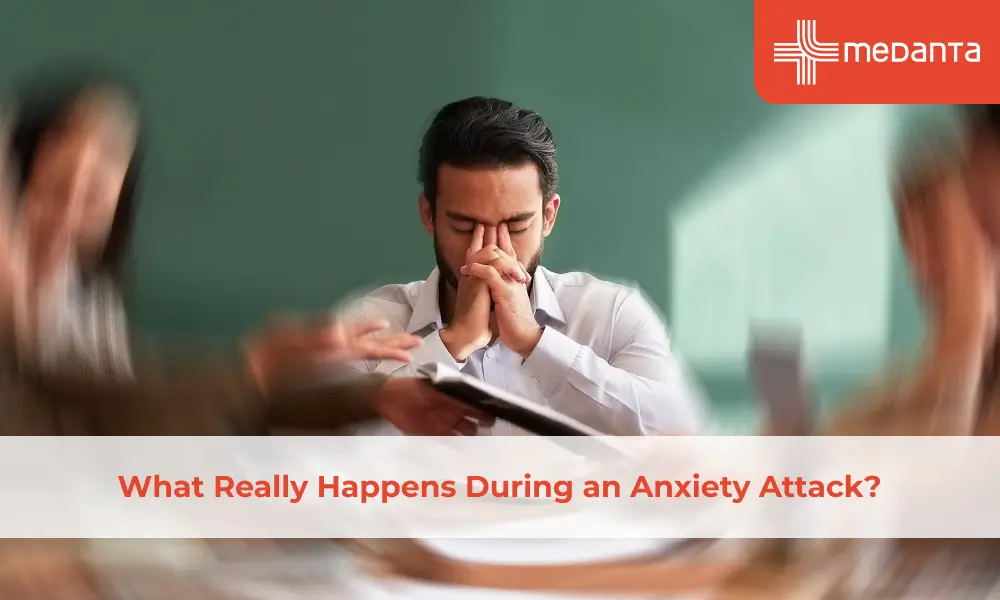What Really Happens During an Anxiety Attack?

TABLE OF CONTENTS
An anxiety attack is characterized by intense bodily reactions to common, non-threatening events that result in severe and sudden sensations of anxiety. You can feel like your heart is pounding and have trouble breathing while you're having an anxiety attack. Some people often mistake an anxiety attack for a heart attack because of their severity.
Compared to older persons, young people are more prone to suffer anxiety attacks, and about 50% of those under the age of 25 report having anxiety or depressive symptoms. When someone has an anxiety disorder, they experience ongoing fear and anxiety at all times. In such cases, doctors recommend that the person avoid social events, such as family gatherings or work parties, because of the extreme anxiety, which might trigger or worsen their symptoms.
What are Anxiety Attacks?
Anxiety attacks are intense panic episodes that can result in palpitations and rapid heart rate. Although having an anxiety attack can be a sign of another mental health diagnosis, such as anxiety disorder, it is not a diagnostic in and of itself. For anxiety attacks, it's critical to get medical attention so that your medical professional can identify the underlying reason and put you in contact with the right services, including counselors and psychiatrists. They could also recommend helpful lifestyle adjustments and self-care practices to control the issue.
People who suffer from General Anxiety Disorders often experience an anxiety attack. Even commonplace or everyday actions and occurrences cause continual anxiety and stress in people with generalized anxiety disorder. However, people who have not been diagnosed with this disorder also suffer from these attacks. Although each individual experiences anxiety differently, anxiety attack symptoms generally cause the body to respond in a very particular way. Your body goes on high alert when you experience anxiety, scanning the environment for potential threats and triggering your threat reaction. The exact causes of anxiety attacks and panic attacks are still unknown, and the trigger event can vary from person to person
What Happens During an Anxiety Attack?
The severe physical sensations that people experience during an anxiety attack are the result of the body going into fight or flight mode. Typically, your nervous system activates in response to any threat, and your bloodstream is overflowed with the hormone adrenaline, which puts your body on high alert. You start breathing quickly and shallowly in order to absorb more oxygen and your heart rate increases, supplying your muscles with extra blood. Your blood sugar levels also rise quickly and these rapid adjustments provide you with the stamina you need to fight a risky scenario or rapidly flee the area of danger.
Unexpected anxiety attack episodes cause your body to become hypervigilant but researchers are unsure about the precise cause of them. However, the bodily consequences of those effects include adrenaline levels in the body that can increase by two and a half times or more during an anxiety attack.
It's possible that anxiety attacks are not as sudden as they appear, and sometime before an attack, the body's chemical balance may begin to alter. In a research study, participants who suffer from anxiety attacks wore wearables that monitored their respiration, sweating, and heart rate, and more than half an hour before they experienced the attack, they had lower-than-normal levels of carbon dioxide in their blood, an indication of fast, deep breathing that can leave you breathless.
Here are the main issues people face during an anxiety attack:
1. Rapid Heartbeat
Fast heartbeat, palpitations, and chest discomfort are all common symptoms of anxiety attacks and there can be a higher chance of high blood pressure as well. Anxiety attacks can significantly increase the risk of coronary events in those with preexisting heart disease.
2. Nausea
Anxiety impacts your digestive and excretory systems as well, and you could have nausea, stomachaches, and other digestive problems. An appetite loss may also happen after an anxiety attack, and anxiety problems and the onset of irritable bowel syndrome and bowel infection are interlinked.
3. Headache and Vertigo
Your brain might regularly release stress hormones as a result of persistent stress and anxiety attacks. These situations may make symptoms like vertigo and headaches more common.
4. Restlessness
Your brain overflows your nervous system with hormones and substances intended to aid in your reaction to a threat when you experience anxiety and stress. As a result, cortisol and adrenaline, both stress hormones, get released, making you feel restless. Long-term exposure to stress hormones may harm your physical health even though these hormones may be beneficial during the rare high-stress event.
5. Shallow Breathing
Rapid, shallow breathing is a common symptom of anxiety attacks and these attacks may put you at higher risk of hospitalization if you have chronic obstructive pulmonary disease (COPD). Asthma symptoms might also worsen due to anxiety attacks, so you must be extra careful if you have asthma and also suffer from anxiety attacks.
6. Lightheadedness
Anxiety attacks have the power to set off your body's fight-or-flight reaction and produce a barrage of chemicals and hormones, including adrenaline. Your breathing and heart rate will quicken, providing your brain with extra oxygen in the short term. This gets you ready to handle a stressful circumstance in the right way. Still, during an anxiety attack, the body works inefficiently, and too much oxygen will make you feel lightheaded.
Final Remarks
Even though it may seem like anxiety attack symptoms come suddenly, usually, there is a triggering event behind it. Anxiety attacks are similar to other mental health conditions, and they are not the result of personal weakness, lifestyle choices, or issues with upbringing. However, the precise source of anxiety attacks is unknown to experts, but they believe that several variables are involved that result in this condition.
The common signs of an anxiety attack are palpitation, sweating, abrupt beginning of shortness of breath, and a feeling of extreme stress. An anxiety attack often starts suddenly, and patients often say that during an attack, they feel like they might die. Even in the absence of a real threat to one's life or safety, an anxiety episode can nevertheless be scary.
The good news is there are now treatments for anxiety attacks that can help you control the intensity of the attack and eventually completely stop them. Visit a mental health practitioner today and discuss the best course of action to benefit you.






